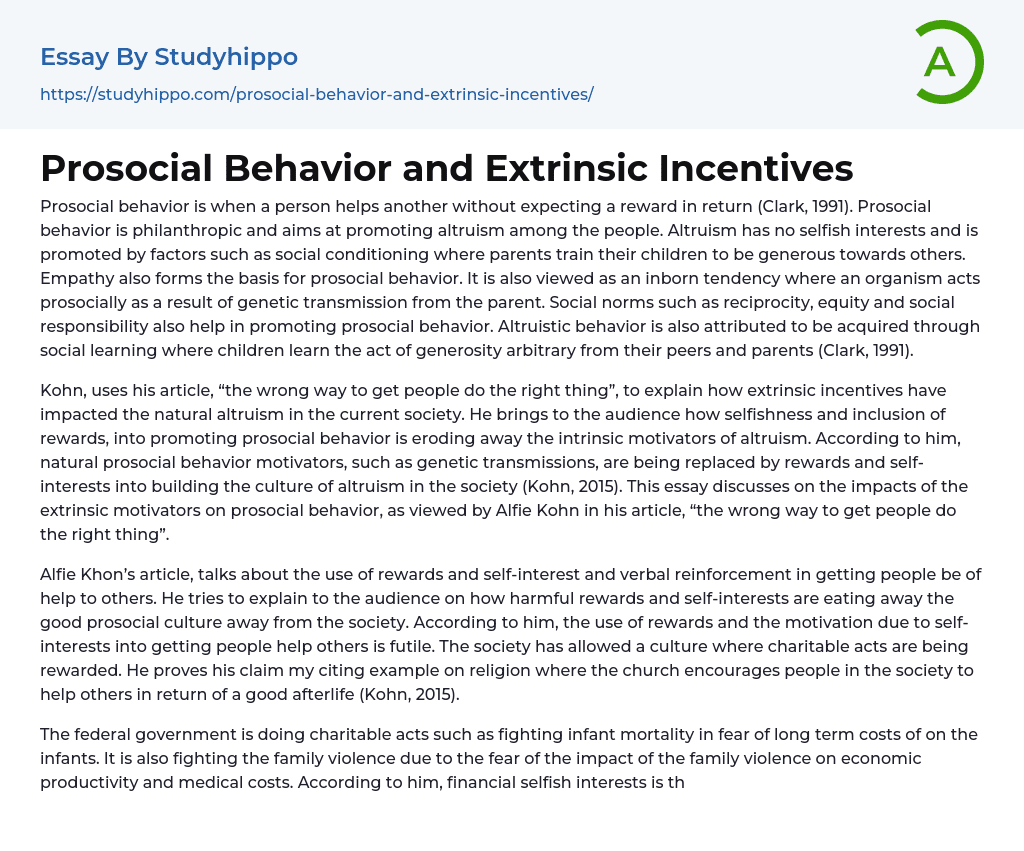

Prosocial Behavior and Extrinsic Incentives Essay Example
Prosocial behavior refers to selfless acts of helping others without any expectation of reciprocity, as defined by Clark (1991). Its purpose is to encourage altruism in society and can be influenced by factors such as social conditioning. Parents play a crucial role in instructing their children on engaging in acts of generosity towards others.
Empathy serves as the basis for prosocial behavior, which can be acquired through genetic inheritance or learned via social interactions. Prosocial behavior is further influenced by social norms such as reciprocity, equity, and social responsibility. Clark (1991) suggests that altruistic actions are attained through observing and imitating peers and parents. Conversely, Kohn's article "the wrong way to get people do the right thing" asserts that utilizing external incentives and rewards to encourage prosocial behavior diminishes society's inherent inclination towards selflessness.
In his article "the wrong way to get p
...eople do the right thing," Alfie Kohn argues that natural prosocial behavior motivators, such as genetic transmissions, are being substituted by rewards and self-interests when fostering an altruistic culture in society (Kohn, 2015). This essay examines the effects of extrinsic motivators on prosocial behavior according to Kohn. He highlights how rewards and self-interests detrimentally impact the prosocial culture within society and emphasizes the importance of using verbal reinforcement to encourage helpfulness towards others.
According to the author, rewarding individuals for helping others and motivating them through self-interest is ineffective. In society, charitable acts are commonly incentivized. This is exemplified in religion, where the church encourages people to assist others in exchange for a positive afterlife (Kohn, 2015). Similarly, the government engages in charitable acts, such as combating infant mortality, out of concern for the potential long-term
costs associated with infants.
The fear of the impact of family violence on economic productivity and medical costs has prompted efforts to combat it. The promotion of charitable or prosocial behavior in society is driven by financial selfish interests, rather than altruism. Resolving societal issues like unemployment is no longer driven by altruism, but by the overall costs it would incur for corporations. This perspective holds that rewards undermine altruism. Consequently, advocates of altruism are seen as naive and weak, while those who provide assistance based on self-interest are perceived as shrewd pragmatics.
According to the writer, performing an activity without a reward results in low quality. Rewards only encourage altruism in the short term and do not work in the long term. The presence of rewards hinders people from considering themselves as truly selfless; thus, their altruism decreases once the reward is gone. People who have been rewarded for certain actions are unlikely to continue doing them without further rewards. To cultivate genuine altruism instead of self-interest driven altruism, it is crucial to encourage individuals, including children, to view themselves as generous (Kohn, 2015).
Natural altruism has a lasting and influential impact on individuals' minds, but rewards and self-interests only serve as external motivations for a limited time and in specific situations (Sansone ; Harackiewicz, 2000). Khon's article convinces me that the inclusion of incentives and selfishness is causing a decline in people's prosocial behavior. The inherent desire for altruism has decreased, to the point where even the government provides social assistance not out of genuine care for its citizens but to avoid negative effects on the economy.
The utilization of rewards to encourage altruism is diminishing the
inherent motivators of prosocial behavior. Rewards are impacting the internal motivators that drive individuals towards altruistic acts and are causing significant negative consequences for society. In particular, rewards are suppressing positive attitudes and stifling creativity among individuals, including students in educational settings. Consequently, in societies where altruism is practiced solely out of self-interest and selfish motives, young individuals are more likely to adopt such behaviors as well (Sansone ; Harackiewicz, 2000).
References
- Clark, M. S. (1991). Prosocial behavior. Newbury Park, Calif: Sage Publications.
- Kohn, A. (2015). The Wrong Way to Get People to Do the Right Thing (1st ed.). Retrieved from http://www.alfiekohn.org/blogs/self-interest/?print=pdf
- Sansone, C., ; Harackiewicz, J. M. (2000). Intrinsic and extrinsic motivation: The search for optimal motivation and performance.
San Diego: Academic Press.
- Adult essays
- Aggression essays
- Altruism essays
- Archetype essays
- Behavior essays
- Certainty essays
- Conformity essays
- Deception essays
- Human Behavior essays
- Human Sexuality essays
- Maturity essays
- Morality essays
- Obedience essays
- Procrastination essays
- Reinforcement essays
- Role Model essays
- Positive Attitude essays
- Caste System essays
- Citizenship essays
- Civil Society essays
- Community essays
- Culture essays
- Deviance essays
- Discourse Community essays
- Female essays
- Filipino People essays
- Igbo People essays
- Indigenous Australians essays
- Indigenous Peoples essays
- Men essays
- Middle Class essays
- Minority Group essays
- Modern Society essays
- Popularity essays
- Social Control essays
- Social Institution essays
- Social Justice essays
- Social Norms essays
- Social Responsibility essays
- Socialization essays
- The nation essays



